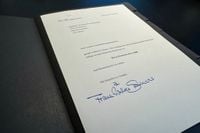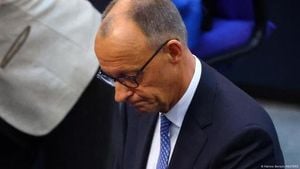In a historic turn of events on May 6, 2025, Friedrich Merz, the leader of the Christian Democratic Union (CDU), faced an unexpected setback in his bid to become the Chancellor of Germany. During the first round of voting held in the Bundestag, Merz fell short of the necessary majority, securing only 310 votes out of the 621 cast. This result marked the first time a designated chancellor has failed to win in the initial ballot following successful coalition negotiations, a situation that has left the political landscape in Germany uncertain.
The voting process was overseen by Bundestag President Julia Klöckner, who announced the results, revealing that Merz needed 316 votes to achieve a majority. The coalition of CDU/CSU and the Social Democratic Party (SPD) holds a combined total of 328 seats in parliament, raising expectations that Merz would secure the necessary votes. However, the failure has prompted discussions about potential next steps and the future of the coalition.
In light of this unprecedented outcome, the CDU faction confirmed there would be no second ballot on the same day. Silvia Breher, the CDU's Deputy Chair, and Steffen Bilger, the First Parliamentary Secretary of the CDU/CSU parliamentary group, indicated that the party would regroup and strategize before the next vote. "We need to clarify how we will proceed from here," Breher stated.
As the political maneuvering continues, the SPD's Lars Klingbeil emphasized that there were no indications of dissent within his party, stating, "On us, you can rely." The SPD had previously secured an 85 percent approval from its members for the coalition agreement, which had been signed on May 5, 2025. Klingbeil expressed confidence in the party's unity and commitment to the coalition.
The failure of Merz has also drawn reactions from other political factions. The Left Party described the outcome as a vote of no confidence against Merz, with party leader Jan van Aken questioning how Merz could gain the trust of the public when he struggled to secure the support of his own party. Ines Schwerdtner, another prominent member of the Left, criticized Merz for not distancing himself enough from the far-right Alternative for Germany (AfD), stating, "He has torn down the firewall and is now paying the price for it."
Meanwhile, the AfD welcomed Merz's defeat, with party leader Alice Weidel commenting on the fragile foundation of the coalition. "This shows how weak the coalition of the Union and the SPD is," she noted, suggesting that the next steps for Merz and the coalition would be crucial in determining their future.
Looking ahead, discussions are underway regarding the possibility of a second ballot within the next two weeks. According to Article 63 of the German Basic Law, if a candidate fails to achieve a majority, the Bundestag can hold another election within 14 days. If Merz or another candidate fails again, the requirements for election may be lowered to a simple majority rather than an absolute one.
CDU Secretary General Carsten Linnemann has called for a swift resolution, urging for a new ballot to take place as soon as possible. "It must happen quickly," he insisted, emphasizing the importance of moving forward after this setback.
As the political parties negotiate the timing for the next vote, the potential for further complications looms. If no candidate secures the necessary majority, the Federal President has the option to dissolve the Bundestag and call for new elections. This scenario raises questions about the stability of the current coalition and its ability to govern effectively.
In the background, Olaf Scholz, the current Chancellor, remains in office on a provisional basis until a new Chancellor is appointed. Scholz's continued role is mandated by Article 69 of the Basic Law, which states that the Chancellor must carry out their duties until a successor is sworn in. This situation adds another layer of complexity to the ongoing political drama.
The fallout from the failed election has also impacted the financial markets, with Germany's leading stock index, the DAX, falling by 1.1 percent following the news of Merz's defeat. Investors are closely watching the political developments, as uncertainty can often lead to market volatility.
Security measures at the Reichstag building have been heightened amid the political tension, with police establishing multiple security rings around the area. This precaution underscores the significance of the events unfolding in the Bundestag and the potential for unrest as political factions navigate this challenging moment.
As the day progresses, the mood within the Bundestag remains tense. Many representatives have retreated to their party offices to discuss the implications of the election results and strategize for the next steps. The plenary hall, typically bustling with activity, is largely empty as parties regroup and reassess their positions.
In conclusion, the failed election of Friedrich Merz as Chancellor has set the stage for a tumultuous period in German politics. With negotiations for a second ballot underway and the potential for further complications looming, the coming days will be critical in determining the future of the coalition government and the direction of the country.






